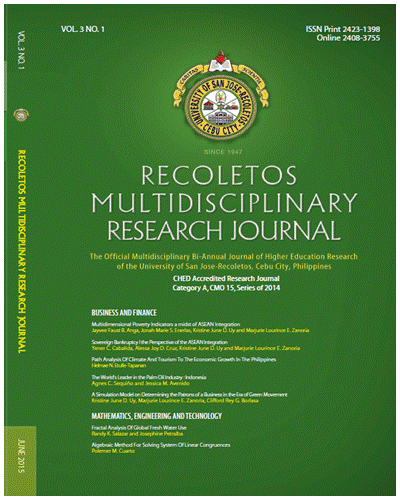An Application of Student Self- Assessment and Newman Error Analysis in Solving Math Problems
DOI:
https://doi.org/10.32871/rmrj1503.01.17Keywords:
Mathematics Education, student self-assessment method, Newman error analysis, Solving math problemsAbstract
The mathematics educators are looking for innovations that remediate the errors
committed by the students in solving math problems. In seeking for solutions, we apply the Student Self –Assessment (SSA) method and Newman Error Analysis (NEA) method to circumvent these errors. The SSA is a strong formative educational tool that enhances selfconfidence to become more independent in assessing their work. While, NEA serves as a powerful classroom diagnostic assessment to identify the skills of the students. It enables the teacher to devise and apply more appropriate teaching strategies and procedures that ignite the students’ interest towards the subject. Out of the 179-students participating in the action research project, we discover that most of the error patterns are due to lack of understanding and transformation skills in solving word problems. With this result, the students encounter language difficulty and immature computational skills. To this end, the investigation and remediation of common math errors was a success in improving and achieving the learning goals and promotes positive behavioral changes towards the subject. The realization of these outcomes is through the inclusion of SSA and NEA. To
sustain the learning goals of the students, it should be properly facilitated to come up with a fruitful learning process.
References
Barbu, O. C. (2010). Mathematics word problems solving by English language learners and web based tutoring system.
Falchikov, N. (2013). Improving assessment through student involvement: Practical solutions for aiding learning in higher and further
education. Routledge.
Jiang, C. (2013). Errors in solving word problems about speed: A case in Singapore and Mainland China. New Waves-Educational Research & Development, 16(1).
Newman, M. A. (1977). An analysis of sixth-grade pupils’ errors on written mathematical tasks. Victorian Institute for Educational Research Bulletin,39(31-43).
Orsmond, P., Merry, S., & Reiling, K. (1997). A study in selfâ€assessment: tutor and students’ perceptions of performance criteria. Assessment & Evaluation in Higher Education, 22(4), 357-368.
Raduan, I. H. (2010). Error analysis and the corresponding cognitive activities committed by year five primary students in solving mathematical word problems. Procedia-Social and Behavioral Sciences, 2(2), 3836-3838.
Ross, J. A. (2006). The reliability, validity, and utility of self-assessment.
Recoletos Multidisciplinary Research Jounal June 2013
Singh, P., Rahman, A. A., & Hoon, T. S. (2010). The Newman Procedure for Analyzing Primary Four Pupils Errors on Written Mathematical
Tasks: A Malaysian Perspective. Procedia-Social and Behavioral Sciences, 8, 264-271.
Topping, K. (2003). Self and peer assessment in school and university: Reliability, validity and utility. In Optimising new modes of assessment: In search of qualities and standards (pp. 55-87). Springer Netherlands.
Sitzmann, T., Ely, K., Brown, K. G., & Bauer, K. N. (2010). Self-assessment of knowledge: a cognitive learning or affective measure?. Academy of Management Learning & Education, 9(2), 169-191.
White, A. L. (2010). Numeracy, Literacy and Newman’s Error Analysis.Journal of Science and Mathematics Education in Southeast
Asia, 33(2), 129-148.
Zakaria, E., & Maat, S. M. (2010). Analysis of Students’ Error in Learning of Quadratic Equations. International Education Studies, 3(3), p105.
Downloads
Published
How to Cite
Issue
Section
License
Copyright of the Journal belongs to the University of San Jose-Recoletos


